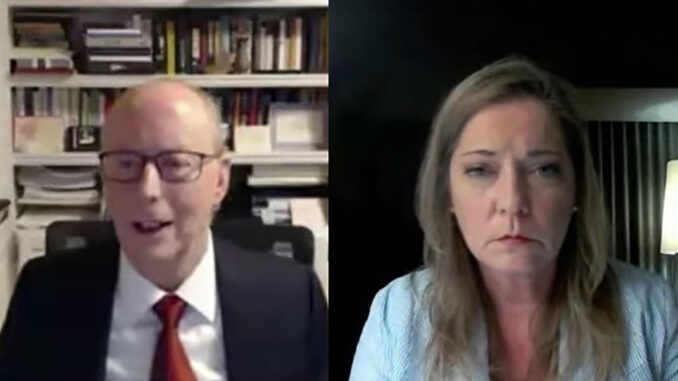
RALEIGH — The decision by the North Carolina State Board of Elections to keep certain parties off the state’s November General Election ballot was the subject of legislative hearing held on July 23.
The House Oversight and Reform Committee’s hearing featured North Carolina State Board of Elections (NCSBE) Chairman Alan Hirsch and Executive Director Karen Brinson Bell as well as Andy Jackson, the director of the Civitas Center for Public Integrity at the John Locke Foundation.
Each of the witnesses was sworn in and had submitted written remarks prior to the hearing.
Committee Co-Chair Jake Johnson (R-Henderson) in his opening remarks laid out the failure of the NCSBE to certify the Justice For All Party (JFA) while recently allowing the We The People Party (WTP) and Constitution Party to be placed on the November ballot.
“Back in March, The New York Times highlighted Democrat Party, state-by-state efforts to deny ballot access to third-party candidates, including North Carolina,” Johnson said, adding that the same thing happened to the Green Party before a judge stepped in to rectify the situation.
“The board of elections must now follow the law in determining who can participate in our elections,” Johnson said.
Jackson, who testified first, said in his prepared remarks that the actions of the NCSBE “were entirely predictable based on the board’s partisan nature.”
The methods the NCSBE used to reject JFA’s petition were questioned by Jackson, including involvement from Clear Choice Action, a group “backed by the Elias Law Group and the North Carolina Democratic Party.” He also compared it to the Green Party case, noting “it was the Democratic Party and the Elias Law Group that spearheaded the effort.”
The day before the hearing, a lawsuit was filed by three citizens from Fayetteville over the NCSBE blocking the Justice For All Party from the ballot despite the party meeting all legal requirements to be certified. The lawsuit also cites interference by Clear Choice Action and the Elias Law Group.
“The events of the past several years have taught us that the party certification process is, if not broken, susceptible to manipulation by groups that believe that ‘everything is on the table’ when it comes to preventing minor parties from gaining access to the ballot,” Jackson said, adding that the General Assembly should ensure the process for the ability of parties to get on the ballot.
Hirsch attended the hearing remotely via video conference.
Rep. Allen Chesser (R-Nash) called into question Hirsch’s use of the “Kennedy” party in place of We The People Party during his testimony, and told Hirsch, “This tells me that you are very much aware of who stands to gain and who stands to lose by these parties moving forward.”
“You’re more focused on the individual candidates than the people who are trying to support these candidates,” Chesser added. “Which as our prerogative on this body, is to make sure that the people’s voices are heard, not political voices.”
Johnson questioned Hirsch about who he had been in contact with about party petition certifications, quizzing him on more than a dozen names, including Gov. Roy Cooper, and his two top aides, former Chief of Staff Kristie Jones and senior adviser Ken Eudy.
Johnson also asked about Cooper campaign advisers Morgan Jackson and Scott Falmlen (Nexus Strategies), Clear Choice Action, state and national Democratic Party officials, the Biden/Harris campaign, Attorney General Josh Stein and his campaign, as well as Mark Elias or anyone from Elias’ law firm.
Hirsch said “no” to all but two: Morgan Jackson and Marc Elias.
Johnson asked Hirsch if communications with Marc Elias were solicited by the board or “just sent out of the goodness of their heart.”
“I assume it was at their desire,” Hirsch replied. He added to his knowledge no requests came from the other board members and he did not send a request himself.
Johnson responded that “we will certainly follow up” with the rest of the NCSBE members to see if they had interactions “from a group known to be very politically active in one direction.”
When asked about communications with Jackson, Hirsch replied, “Well, Morgan and I have been friends for, I don’t know, a decade at least, and he has opinions.
“I have friends and family that have expressed their opinions to me as well. And there are times that I just have to tell Morgan, ‘Sorry, that’s not what we’re doing.’”
Like Hirsch, Brinson Bell appeared remotely as she was out of the state at the summer conference of the National Association of State Election Directors.
Brinson Bell’s presentation affirmed involvement by outside parties tied to the national Democratic Party in challenging the certification of the parties in question, noting that, “An objection letter was sent from Clear Choice Action (CCA) regarding the We The People and Justice for All petitions.”
In the case of JFA, Brinson Bell’s presentation reiterated that NCSBE staff tried to contact 250 additional petition signers and 49 were reached. Out of the 49, three said they didn’t remember signing the petition and 18 said they didn’t sign it.
“I’m sure there will be a follow-up, but we certainly hope going forward that there’s a level of transparency about what’s coming in and out to the board,” Johnson said as he closed out the meeting after just over four hours. “And hopefully that they are making the decisions based on the merits that they’re seeing in front of them and not outside forces being colluded to from outside the board.”



